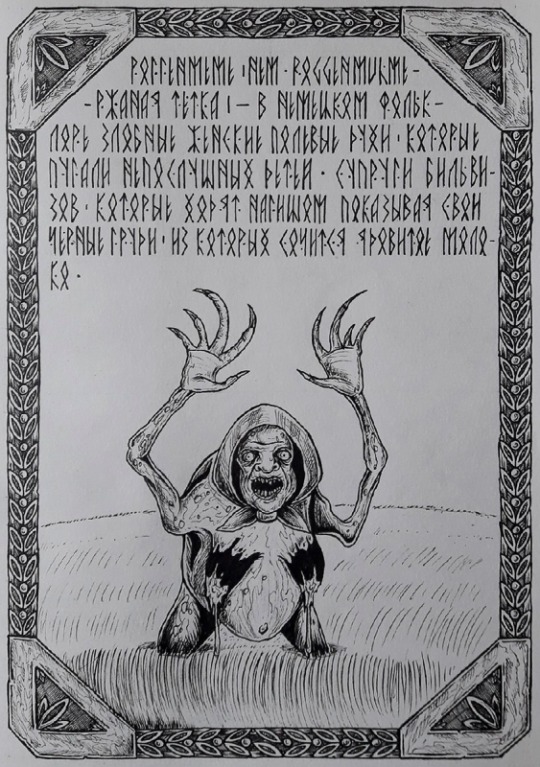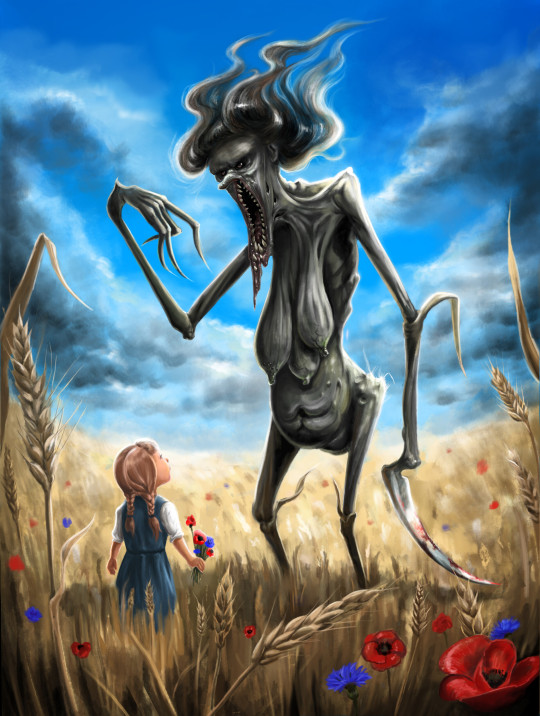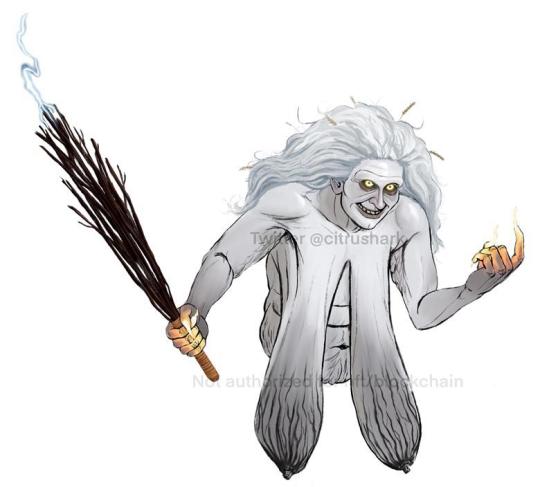Text
nur Bahnhof verstehen
literally: to understand nothing but train station
to understand nothing or not wanting to understand anything
Origin: The phrase has its origins in the First World War, when soldiers, tired from years of trench warfare, only wanted to hear the word “train station,” which for them was synonymous with a journey home.
39 notes
·
View notes
Text
Die Roggenmuhme
The Rye Aunt
The Rye Aunt is a female cereal demon and children's fright of German folk tales, who lives in grain fields.
The Rye Aunt wanders up and down in the fields, feeds on the grain and tears out the immature ears. If she is angry with the farmer, she punishes him by drying out his fields. In general, however, the appearance of the Rye Aunt in the fields is a sign of a good harvest. During the harvest, she flees into the last truss. The Rye Aunt receives a share of the harvest, which is either left behind or thrown into the field. This custom is to propitiate the Rye Aunt and bring about a fertile next year.

The Rye Aunt is generally thought to live underground, in the empire of the roots or in a cave.
The Rye Aunt punishes lazy maids, who have not spun off their spinning rocks in the Boxing Week. The breath of the Rye Aunt brings illness and death.
Appearance
The Rye Aunt is often described as completely black or snow-white, and of superhuman size. Her arms are long or made of iron. Her fingers are fiery or iron. It is also said that the Rye Aunt has claws on her hands, which may also be made of iron.

The Rye Aunt has unusually large breasts that are so long that she can fold them over her shoulders. She also has more than two breasts. These can be black, iron, wooden or silver. They are pointed and hard, have glowing iron tips or are fiery. The breasts are filled with tar, poisonous milk or blood.
The Rye Aunt is described as an old womanwith a wrinkled face featuring stinging awns, a crooked nose, and wears glasses. She is sometimes even described as headless or said to have an iron heart.
In addition, she can change her shape, for example into a turtle, a snake, a frog, a wolf, a black cat, a horned animal or a dog with a blanket.

The Rye aunt is often dressed in black, but has also been seen dressed entirely in gray. Her clothes are ragged. Sometimes the Rye Aunt also wears a red skirt, or she wears a red dress and a red cap. Sometimes, she wears blue coat and wide flowing skirts. Often the Rye Aunt wears a white headscarf like a reaper. Sometimes she walks on crutches.
The Rye Aunt is associated with several weather phenomena. When the wind blows through the cornfield, people say that the Rye Aunt moves over the grain. She is also traveling with the whirlwind.
The Rye Aunt appears in particular at midday between 12:00 and 13:00. If she encounters someone in the fields at midday, she kills them or frightens them, casting spells. If she finds women who have recently given birth in bed between 12:00 and 13:00 and between 18:00 and 20:00, she does the field work for them. If she does not find women in childbed at the specified time, a misfortune will happen to the mother and the child.
The Rye Aunt is often seen as a child scare. Her activities as a child-scaring figure are extremely varied.

In their tale no. 90 The Rye Aunt, the Brothers Grimm tell that the Rye Aunt swaps human children with changelings, but brings back the right child if the changeling is not suckled. Elsewhere it is said that she steals illegitimate children at midnight.
The Rye Aunt lies in wait in the field for all those children who want to pick cornflowers in order to scare and punish them. She also lures children into the field by waving her arms. She abducts children by putting them in her big bag or basket, of by taking the children under her wide flowing skirts to bring them to the empire of the roots. She may also pull children to her with an iron fireplace poker and has them guarded by a toad. She leads children astray in the field and lets them starve to death, or she comes with her flock of elves and lays the children on cushions of flowers, whereupon they fall asleep and never wake up again. The Rye Aunt appears as a witch when she casts spells or the Evil Eye on children, She may also appear as a nightmare when she sends evil spirits to disobedient children at night.
Children often have to suck on the breasts of the Rye Aunt. Sometimes, disobedient children get the big breasts beaten around their ears. The Rye Aunt is said to, hug children so tight that they are pressed against her breasts die as a result from suffocation or getting crushed in her embrace. The Rye Aunt also crouches in wolf form, hiding in the grain, and is accompanied by small dogs that lure children into her iron embrace. She is also regarded as the mother of the rye wolves, who eat the children.

The Rye Aunt chases children on horseback or runs as fast as a horse herself. In the latter case, she chases children to death in races. She can also fly and takes children to the sea to drown them there. If she accosts children, they must die.
The Rye Aunt demands that children eat a slice of bread spread with tar. If they do not comply, she cuts off their heads. She also smears children with tar from a bottle or covers their eyes with tar. She also scratches out children's eyes or blows out their eyesight. The Rye Aunt strangles children, twists their necks or cuts off their heads, and also cuts off their necks, noses, ears, or fingers. She also beheads children with a sickle, a knife or a saw. She cuts off the children's legs with a scythe. The Rye Aunt also tears off children's legs.
The Rye Aunt binds children into a bundle with a thread or ties the children to a thread and then beats them up. She pinches children with iron pincers or uses a pinch. She stabs children with pikes, of which she has three, one by the head and one in each hand. The Rye Aunt also stabs children with stalks or drives nails into their heels.

In her hand, the rye maid carries a rod or whip, which is to be regarded as a lightning rod. She also has a sceptre or an iron scourge, which she uses to beat children. She puts children in a nail barrel and rolls them around in it or drags them into a cave and crushes them there with a giant meat grinder. Otherwise, she also crushes children in an iron butter churn.
The Rye Aunt also bites and eats children. To get hold of children, she sets out traps. She slaughters and eats the children or kills and roasts them using her burning breasts and fingers. The Rye Aunt also throws children into a cauldron of hot water or sucks their blood.
All these stories were told children to deter them from wandering through the fields, which posed several dangers, including getting lost and freezing to death at night, encounters with dangerous animals, suffering injuries from farm equipment used on the fields, or merely the destruction of crops and yield loss by walking over the fields.
37 notes
·
View notes
Text
Krieg kennt keine Sieger, jeder militärische Triumph erweist sich in Wahrheit als Niederlage aller Beteiligten.
War knows no winners; every military triumph actually turns out to be a defeat for all involved.
Carl Philipp Gottlieb von Clausewitz (1780 – 1831), Prussian general, army reformer, and military theorist
35 notes
·
View notes
Text


incredible translation of sheeesh thank you google
4K notes
·
View notes
Text
Der Krieg ist eine bloße Fortsetzung der Politik mit anderen Mitteln.
War is merely the continuation of politics by other means.
Carl Philipp Gottlieb von Clausewitz (1780 – 1831), Prussian general, army reformer, and military theorist
18 notes
·
View notes
Text

The Language Nerds
44 notes
·
View notes
Text
Im Reich der Interpunktionen
nicht fürder goldner Friede prunkt:
Die Semikolons werden Drohnen
genannt von Beistrich und von Punkt.
Es bildet sich zur selben Stund
ein Antisemikolonbund.
Die einzigen, die stumm entweichen
(wie immer), sind die Fragezeichen.
Die Semikolons, die sehr jammern,
umstellt man mit geschwungnen Klammern
und setzt die so gefangnen Wesen
noch obendrein in Parenthesen.
Das Minuszeichen naht, und - schwapp!
da zieht es sie vom Leben ab.
Kopfschüttelnd blicken auf die Leichen
die heimgekehrten Fragezeichen.
Doch, wehe! neuer Kampf sich schürzt:
Gedankenstrich auf Komma stürzt -
und fährt ihm schneidend durch den Hals,
bis dieser gleich - und ebenfalls
(wie jener mörderisch bezweckt)
als Strichpunkt das Gefild bedeckt!
Stumm trägt man auf den Totengarten
die Semikolons beider Arten.
Was übrig von Gedankenstrichen,
kommt schwarz und schweigsam nachgeschlichen.
Das Ausrufszeichen hält die Predigt;
das Kolon dient ihm als Adjunkt.
Dann, jeder Kommaform entledigt,
stapft heimwärts man, Strich, Punkt, Strich, Punkt.
Christian Morgenstern (1871 – 1914)
Hallo deutsches Tumblr - nicht deutschsprachig, sondern wirklich Deutschland-deutsch, bin selber aus Österreich - helft mir, was rauszufinden: Kennt ihr die Wörter "Beistrich" und "Strichpunkt"? Nicht ob ihr sie verwendet, nur ob ihr die schon mal gehört habt und versteht.
147 notes
·
View notes
Text
Krieg ist ein Akt der Gewalt, um den Gegner zur Erfüllung unseres Willens zu zwingen.
War is an act of violence to compel the enemy to fulfill our will.
Carl Philipp Gottlieb von Clausewitz (1780 – 1831), Prussian general, army reformer, and military theorist
19 notes
·
View notes
Text
That's not easy. That's not fun.

Learn-German-Easily
56 notes
·
View notes
Text
Wirtschaften ist friedliche Ausübung von Verfügungsgewalt.
Economics is the peaceful exercise of power.
Max Weber (1864 – 1920), German sociologist, lawyer, and national and social economist
9 notes
·
View notes
Text
sich wie die Axt im Walde benehmen
literally: to behave like the axe in the forest
to behave like a bull in the china shop; to consistently display a destructive behavior; to keep bullying the people around you
22 notes
·
View notes
Text
Das Kommunistische Manifest ist in seiner Art, so sehr wir es in entscheidenden Thesen ablehnen (wenigstens tue ich das) eine wissenschaftliche Leistung ersten Ranges. Das läßt sich nicht leugnen, das darf auch nicht geleugnet werden, weil es einem niemand glaubt und weil es mit gutem Gewissen nicht geleugnet werden kann.
The Communist Manifesto is, in its own way, a scientific achievement of the first order, no matter how much we reject its crucial theses (at least I do). This cannot be denied, and it must not be denied, because nobody believes it and because it cannot be denied in good conscience.
Max Weber (1864 – 1920), German sociologist, lawyer, and national and social economist
11 notes
·
View notes
Text
etwas ausbaden müssen
literally: having to finish the bath
having to pay the price; having to take the blame; to be punished excessively or unjustly for something
Origin: Until modern times, it was not uncommon for several people to have to use the same bath water one after the other. The last person in line did not only get the coldest and dirtiest bath water, but also had to clean the tub and put it back in its place.
37 notes
·
View notes
Text
Erich Kästner — Kennst Du das Land, wo die Kanonen blühn?
Kennst Du das Land, wo die Kanonen blühn?
Du kennst es nicht? Du wirst es kennenlernen!
Dort stehn die Prokuristen stolz und kühn
in den Büros, als wären es Kasernen.
Dort wachsen unterm Schlips Gefreitenknöpfe.
Und unsichtbare Helme trägt man dort.
Gesichter hat man dort, doch keine Köpfe.
Und wer zu Bett geht, pflanzt sich auch schon fort!
Wenn dort ein Vorgesetzter etwas will
und es ist sein Beruf etwas zu wollen
steht der Verstand erst stramm und zweitens still.
Die Augen rechts! Und mit dem Rückgrat rollen!
Die Kinder kommen dort mit kleinen Sporen
und mit gezognem Scheitel auf die Welt.
Dort wird man nicht als Zivilist geboren.
Dort wird befördert, wer die Schnauze hält.
Kennst Du das Land? Es könnte glücklich sein.
Es könnte glücklich sein und glücklich machen?
Dort gibt es Äcker, Kohle, Stahl und Stein
und Fleiß und Kraft und andre schöne Sachen.
Selbst Geist und Güte gibt's dort dann und wann!
Und wahres Heldentum. Doch nicht bei vielen.
Dort steckt ein Kind in jedem zweiten Mann.
Das will mit Bleisoldaten spielen.
Dort reift die Freiheit nicht. Dort bleibt sie grün.
Was man auch baut - es werden stets Kasernen.
Kennst Du das Land, wo die Kanonen blühn?
Du kennst es nicht? Du wirst es kennenlernen!
Do you know the land where the cannons blossom? — by Erich Kästner
Do you know the country where the cannons blossom?
You don't know it? You will get to know it!
There the authorized officers are proud and bold
Standing in the offices as if it were barracks.
Buttons of private uniforms are growing under the tie there.
And you wear invisible helmets there.
You have faces there, but no heads.
And whoever goes to bed is already breeding!
If a manager demands something there
— And it is his job to demand something —
The mind is firstly standing at attention and secondly standing still.
The eyes on the right! And roll with the backbone!
The children come there with small spores
And with a parting in the hair into the world.
You are not born there as a civilian.
Those who keep their mouth shut are promoted.
Do you know the country? It could be happy.
It could be happy and make others happy?
There are fields, coal, steel and stone
And diligence and strength and other beautiful things.
Even intellect and kindness is there every now and then!
And true heroism. But not with many.
There is a child in every second man.
It wants to play with tin soldiers.
Freedom is not ripening there. There it stays green.
Whatever they build there — it will always become barracks.
Do you know the country where the cannons blossom?
You don't know it? You will get to know it!
33 notes
·
View notes
Text
Wer Politik treibt, erstrebt Macht.
Those who engage in politics seek power.
Max Weber (1864 – 1920), German sociologist, lawyer, and national and social economist
11 notes
·
View notes
Text
einen Augiasstall ausmisten
literally: to clean out an Augean stable
to remove large amounts of dirt or mess; to bring order to a chaotic business; to clean up a corrupt organization
Origin: According to Greek legend, Heracles managed to clean the stables of Augeas, where 3,000 cattle were kept, of all filth in a very short time.
19 notes
·
View notes
Text
Es ist durchaus richtig, und alle geschichtliche Erfahrung bestätigt es, daß man das Mögliche nicht erreichte, wenn nicht immer wieder in der Welt nach dem Unmöglichen gegriffen worden wäre.
It is absolutely true, and all historical experience confirms it, that the possible would not have been achieved if the world had not continually striven for the impossible.
Max Weber (1864 – 1920), German sociologist, lawyer, and national and social economist
21 notes
·
View notes